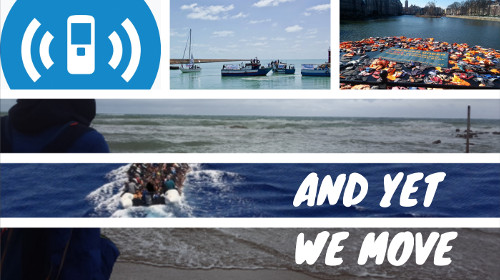
Alarm Phone 6 Week Report, 12 November - 23 December 2018: Over the past six weeks covered by this report, the Alarm Phone witnessed several times what happens when Spanish and Moroccan authorities shift responsibilities and fail to respond quickly to boats in distress situations.
Repeatedly we had to pressurise the Spanish authorities publicly before they launched a Search and Rescue (SAR) operation. And still, many lives were lost at sea. On Moroccan land, the repression campaign against Sub-Saharan travellers and residents continues. On the 30th of November, an Alarm Phone member was, yet again, arrested and :: deported towards the South of Morocco, to Tiznit, along with many other people. Other friends in Morocco have informed us about the deportation of large groups from Nador to Tiznit. Around the 16th of December, 400 people were forcibly removed, and on the 17th of December, another 300 people were deported to Morocco’s south. This repression against black residents and travellers in Morocco is one of the reasons for many to decide to leave via the sea. This has meant that also during the winter, cross-Mediterranean movements remain high. On just one weekend, the 8th-9th of December, 535 people reached Andalusia/Spain.[12]
Whilst people are constantly resisting the border regime by acts of disobedience when they cross the borders clandestinely, acts of resistance take place also on the ground in Morocco, where associations and individuals are continuously struggling for the freedom of movement for all. In early December, an Alarm Phone delegation participated at an international conference in Rabat/Morocco, in order to discuss with members of other associations and collectives from Africa and Europe about the effects of the outsourcing and militarisation of European borders in the desire to further criminalise and prevent migration movements. We were among 400 people and were impressed by the many contributions from people who live and struggle in very precarious situations, by the uplifting atmosphere, and by the many accounts and expressions of solidarity. Days later, during the international meeting in Marrakesh on the ‘Global Compact for Safe, Orderly and Regular Migration’, the Alarm Phone was part of a counter-summit, protesting the international pact on migration which is not meant to reduce borders between states, but to curtail the freedom of movement of the many in the name of ‘legal’ and ‘regulated’ migration. The Alarm Phone delegation was composed of 20 activists from the cities of Tangier, Oujda, Berkane, Nador and Fes. One of our colleagues sums up the event: “We have expressed our ideas and commitments as Alarm Phone, solemnly and strongly in front of the other organisations represented. We have espoused the vision of freedom of movement, a vision without precedent. A vision which claims symbolically all human rights and which has the power to help migrants on all continents to feel protected.” In light of the Marrakesh pact, several African organisations joined together and published a statement rejecting “…the wish to confine Africans within their countries by strengthening border controls, in the deserts, at sea and in airports.”[13]
Shortly after the international meeting in Marrakesh, the EU pledged €148 million to support Morocco’s policy of migrant containment, thus taking steps towards making it even more difficult, and therefore more dangerous for many people on the African continent to exercise their right to move freely, under the pretext of “combating smuggling”. Making the journeys across the Mediterranean more difficult does not have the desired effect of ending illegalised migration. As the routes to Spain from the north of Morocco have become more militarised following a summer of many successful crossings, more southern routes have come into use again. These routes, leading to the Spanish Canary Islands, force travellers to overcome much longer distances in the Atlantic Ocean, a space without phone coverage and with a heightened risk to lose one’s orientation. On the 18th of November, 22 people lost their lives at sea, on their way from Tiznit to the Canary Islands.[14] Following a Spanish-Frontex collaboration launched in 2006, this route to the Canary Islands has not been used very frequently, but numbers have increased this year, with Moroccan nationals being the largest group of arrivals.[15]

Notes
[12] https://elpais.com/politica/2018/12/09/actualidad/1544345368_332692.html?autoplay=1
[13] http://www.statewatch.org/news/2018/dec/appeal-by-african-civil-society.pdf?fbclid=IwAR0Np2Ej6ELDCyNd5svxZ4HLO5bs3WADPThF1KQGGG5MF6EUecOwJ8fd2mU
[14] https://www.huffpostmaghreb.com/entry/22-migrants-marocains-perdus-au-large-des-iles-canaries-apres-le-naufrage-de-leur-embarcation_mg_5bf29cbee4b0f32bd58b5e29?utm_hp_ref=mg-maroc
[15] https://uk.reuters.com/article/uk-europe-migrants-africa/african-migrants-turn-to-deadly-ocean-route-as-options-narrow-idUKKBN1O210G
More of Alarm Phone 6 Week Report:
:: Introduction: And Yet We Move - 2018, a Contested Year
Auf deutsch :: Einleitung: Und Wir Bewegen Uns Doch - 2018, ein umkämpftes Jahr
:: Developments in the Central Mediterranean
:: Developments in the Aegean Sea
:: Full Alarm Phone 6 Week Report, 12 November - 23 December 2018 @ alarmphone.org
Source :: alarmphone.org, 27. Dec 2018.



 grenzregime
grenzregime